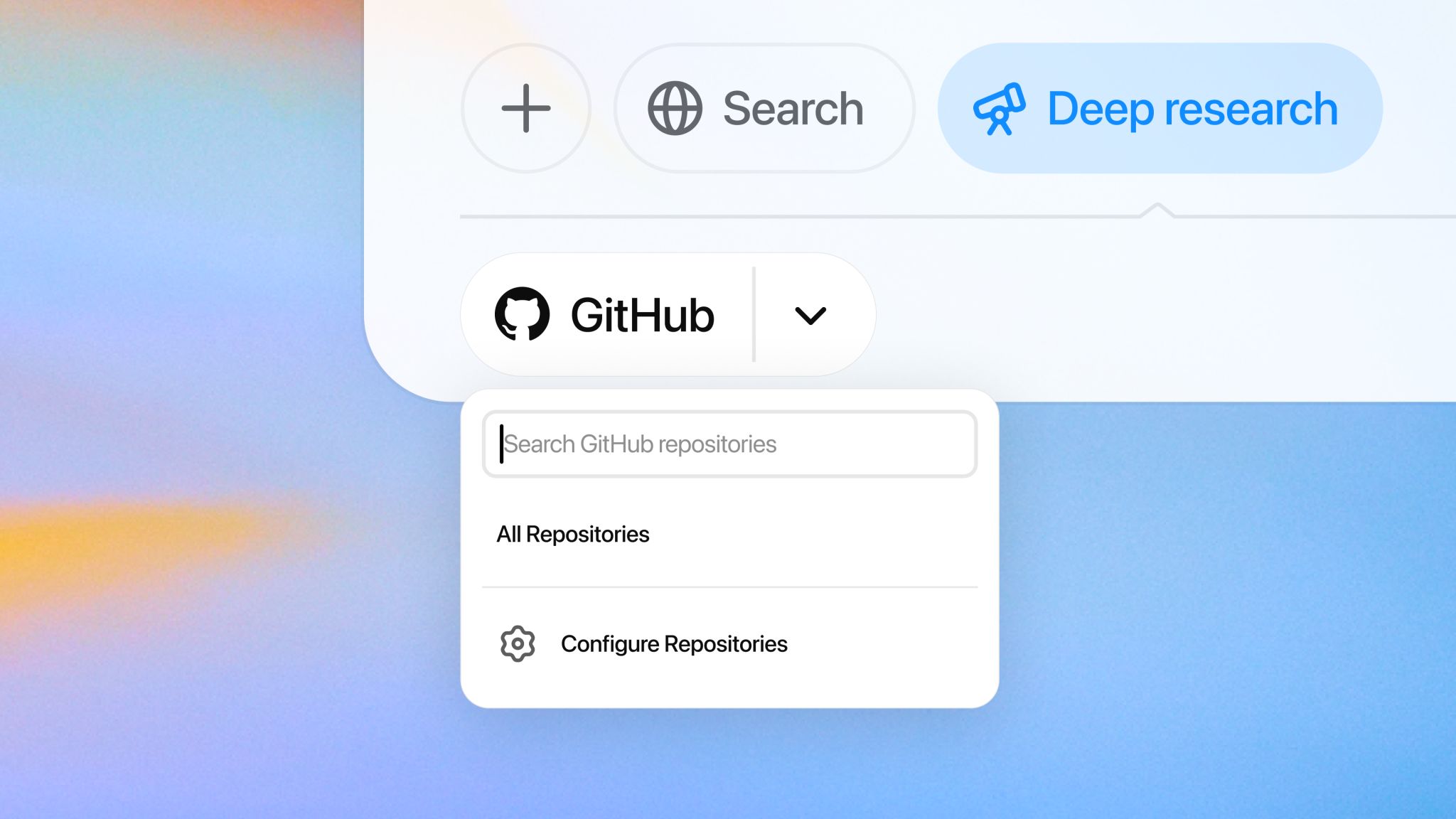AI Summary
OpenAI has launched a new GitHub connector for ChatGPT's Deep Research feature, allowing developers to connect their code repositories and engineering documentation for analysis. This integration enables ChatGPT to answer detailed questions about codebases, break down product specifications, summarize code, and assist with API implementation, transforming it into a more specialized tool for software development teams. This move is part of OpenAI's broader strategy to embed AI into professional workflows through targeted integrations.
OpenAI has
unveiled a new GitHub connector for ChatGPT's Deep Research feature, marking a strategic pivot toward more integrated developer tools. This addition transforms ChatGPT from a general-purpose AI assistant into a potentially powerful ally for software development teams, capable of analyzing entire codebases and engineering documentation to provide comprehensive insights.
Bridging the Gap Between AI and Development Workflows
OpenAI's Deep Research feature, which previously allowed users to search across the web for comprehensive research reports, now extends its capabilities directly into the development environment. According to Nate Gonzalez, OpenAI's Head of Business Products, this integration responds to consistent user feedback: "I often hear that users find ChatGPT's deep research agent so valuable that they want it to connect to their internal sources, in addition to the web."
This connector arrives at a pivotal moment in the AI industry, as major players race to make their models more useful by creating connections to external platforms and services. While Anthropic recently introduced Integrations for its Claude chatbot, OpenAI has chosen a more focused approach after deprecating its earlier plug-in ecosystem in favor of custom GPTs.
What Developers Can Actually Do With It
The GitHub connector significantly expands ChatGPT's utility for software development teams. According to OpenAI, the integration enables developers to:
- Ask detailed questions about specific codebases and receive comprehensive, cited responses
- Break down product specifications into technical tasks and dependencies
- Summarize code structure and identify patterns across repositories
- Learn how to implement new APIs using real code examples from their repositories
- Analyze engineering documentation alongside code for better context
For developers struggling with unfamiliar codebases or complex systems, this could substantially reduce onboarding time and increase productivity. Rather than spending hours manually tracing code paths or reading documentation, developers can potentially get answers in minutes.
Security and Access Controls
OpenAI has emphasized that security remains paramount with this integration. The company states that ChatGPT will respect an organization's existing GitHub permissions, ensuring users only see content they're already authorized to access. Repositories must be explicitly shared with ChatGPT, providing an additional layer of control for sensitive codebases.
This permission-based approach addresses a critical concern for enterprise users who might otherwise be hesitant to connect AI systems to their proprietary code. However, as with any integration involving sensitive intellectual property, companies will likely scrutinize the implementation details before widespread adoption.
The Broader Developer Strategy at OpenAI
The GitHub connector isn't developing in isolation - it represents another piece in OpenAI's expanding developer-focused ecosystem. Recent months have seen the company:
- Release Codex CLI, an open-source coding tool for terminals
- Update the ChatGPT desktop app to better read code from developer-focused applications
- Reportedly reach an agreement to acquire AI-powered coding assistant Windsurf for $3 billion
- Launch fine-tuning options for its newer models, including the o4-mini "reasoning" model
These moves collectively signal OpenAI's recognition of software development as a prime use case for its technology. By creating specialized tools rather than one-size-fits-all solutions, the company appears to be targeting professional workflows where AI can provide concrete, measurable value.
OpenAI's approach contrasts with strategies from competitors like Anthropic, which has focused on broader application integration through its Claude chatbot. While OpenAI initially offered a plug-in ecosystem for ChatGPT, it later deprecated this in favor of custom chatbots called GPTs, suggesting a shift toward more controlled, specialized applications.
The GitHub connector represents a return to integration, but with a more focused approach targeting specific high-value professional workflows. This may reflect lessons learned from earlier experiments with more general integration frameworks.
According to OpenAI, the GitHub connector is being rolled out to ChatGPT Plus, Pro, and Team users over the next few days, with support for Enterprise and Edu customers coming soon. This phased approach allows the company to monitor performance and gather feedback before wider deployment.
Limitations and Potential Concerns
Despite its promise, OpenAI acknowledges the technology has limitations. Like all current AI systems, ChatGPT's Deep Research feature can sometimes "hallucinate" or generate plausible-sounding but incorrect information. For code analysis, such errors could potentially lead developers down unproductive paths.
OpenAI is careful to position the tool as a time-saver rather than a replacement for expert judgment. This framing acknowledges both the current capabilities and limitations of the technology while setting appropriate expectations for users.
Another consideration is how this technology might affect software development practices. While it promises to make certain tasks more efficient, it could also create dependencies on proprietary AI systems within development workflows.
The Future of AI-Assisted Development
Looking ahead, the GitHub connector hints at a future where AI assistants become deeply integrated into the software development lifecycle. Beyond simply generating code snippets, these systems could eventually:
- Participate in architectural planning by analyzing existing systems
- Identify potential security vulnerabilities across complex codebases
- Suggest optimizations based on performance patterns
- Help maintain documentation that stays synchronized with code changes
- Facilitate knowledge transfer between different teams and projects
Gonzalez's question to users about what connector OpenAI should build next suggests this is just the beginning of a broader strategy to embed ChatGPT into professional workflows through targeted integrations.
Recent Posts
